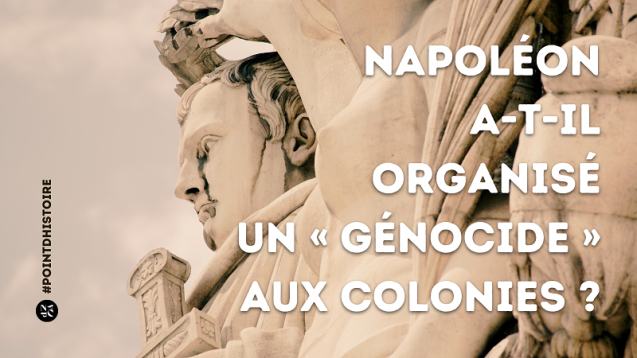According to the writer Claude Ribbe, Napoleon ordered the “genocide of Blacks” in the colonies. This is the thesis he supports in a book published in 2005: Le crime de Napoléon.
At the time, Pierre Nora described the book as a “headless libel/squib (‘pamphlet‘)” (Le Monde, 13 December 2005). The “genocide” accusation has never been taken seriously by specialists in colonial history or slavery. In any case, they have sufficient “incriminating” evidence with respect to the re-establishment of slavery by Bonaparte in 1802.
Playing heavily on the current hypersensitivity to these subjects, Mr Ribbe maintains that Napoleon had programmed the systematic elimination of men of colour. He speaks of a million black victims of the “first racist dictator” … And yet there were “only” 800,000 slaves in the French West Indies at the time (600,000 in Saint-Domingue, 85,000 in Martinique and 90,000 in Guadeloupe), and the most serious historians estimate that colonial wars in the West Indies between 1802 and 1804 resulted in 100,000 deaths, of which about 70% were black. The toll is sufficiently terrible that it is not worth inflating it so grossly.
But Monsieur Ribbe goes even further. He offers his readers a parallel with the Shoah. The opportunity is offered to him by the implacable repression in Guadeloupe, led by General Richepance, and by the massacres ordered in Saint-Domingue by General Rochambeau, including – and this is the key fact – the killing by asphyxiation of some of them in the holds of a ship. Napoleon (who was thousands of kilometres away at the time) is said to have invented the gas chambers, an assertion that seems to be part of a victim competition which aims at placing the Holocaust and colonial events on the same footing.
For their book Napoléon, l’esclavage et les colonies (Fayard, 2006), Pierre Branda and Thierry Lentz sought evidence for this collective “gassing”, which Ribbe says was massive and repeated. Although it is not mentioned in the archives or in contemporary testimonies, it does appear in later Haitian texts and was included in Victor Schœlcher’s biography of Toussaint-Louverture. We are not saying that these facts did not exist, but we are asserting that, if they did exist, they were not part of a general plan of extermination. Branda and Lentz point out that in the West Indies, the only general massacre of human beings because of their skin colour was the one given by the first Haitian head of state, Jean-Jacques Dessalines, to liquidate the white men, women and children. He said he wanted an “ocean of blood” between his island and the former coloniser to make a return impossible. The operation took place from February to April 1804, and only the doctors were spared. The following May, Dessalines proclaimed himself Emperor of Haiti, under the name of Jacques I.
Whilst in his instructions and and correspondence, Bonaparte encouraged great severity, he did not give any orders for massacre. When he did find about the massacres, but probably not down to the smallest detail, it was months after the fact (it took four or five months for a return trip between the West Indies and the mainland). He did not publicly disavow his subordinates, which is already serious enough. As for the rest, we can safely say that he did not organise, nor did he wish for, any genocide whatsoever. He was no more ‘racist’ – the word did not exist – than his contemporaries, for whom the issue of slavery was not a priority, alas.
10 December 2020 (Eng. trans 14 April 2021)
More episodes of “Napoleon, the dark side”:
► The human cost of the Napoleonic wars (< 3 min. read)
► Napoleon and the colonies (< 3 min. read)
► Napoleon’s re-establishement of slavery (< 2 min. read)
► Napoleon and Santo Domingo (Haïti and Santo Domingo) (< 4 min. read)
► Napoleon and Guadeloupe (< 2 min. read)
► Did Napoleon enact “genocide” in the French colonies? (< 3 min. read)
► Napoleon and women (< 4 min. read)


